 There’s nothing more threatening to the competition than someone who isn’t going anywhere.
There’s nothing more threatening to the competition than someone who isn’t going anywhere.
It’s like Indiana Jones said in The Last Crusade: “I’m like a bad penny – I always turn up.”
The tricky part is negotiating the fine line between patience and passivity.
Here’s how:
1. Practice natural selection. My friend Josh is a professional poker player. He practices dangerous patience in a brilliant way:
“Once I buy into an online tournament, I wait twenty minutes before playing a single hand. Not to study the current players, but to let the weak weed themselves out. Otherwise I might get sucked into their undertow of careless amateurism and make a costly mistake.”
In business and in life, the same goes for you: The longer you wait, the higher the quality of the remaining players. Darwin was right. How much self-control are you willing to practice?
2. People who tell you to “work smart, not hard,” are lazy. Working hard (or smart, for that matter) isn’t enough. You have to work hard, work smart and work long. That’s the trifecta of success nobody wants to face because it involves more sweat and less sleep. Most people want the proven formula of how to “do more in less time with less stress and zero money.”
Sorry, Captain Shortcut. Doesn’t work that way. Life is marathon – not a sprint. Sure, you might see some success in the first few laps. But if you’re solely functioning on a steady diet of “work smart, not hard,” eventually you’re going to get creamed.
You have to pay your dues and take your lumps like everyone else. Otherwise your weak foundation will not sustain you. What fairy tails have you been poisoned by?
3. Remember the Galatians. “Let us not be weary in well-doing, for in due season we will reap a great harvest if we faint not.” My mentor first shared this scripture with me when I was a sixteen, and it’s guided my patience ever since. The painful part, of course, is having faith.
Especially in the beginning when you’ve got zero proof that this principle actually works. When everybody you know is becoming more successful than you, faster than you. And you’re sitting there, KNOWING you work just as hard – if not harder – and deserve the same success.
All I can say is: Hang in there. The playing field levels out eventually. And as you watch the truth of this statement play out, you’ll achieve the small victories necessary to fuel your patience. And when that time comes, you’ll accelerate into pole position while all of the hacks, one-hit-wonders and bullshit artists fall to the wayside. Will you faint not?
4. Patience isn’t idleness. Every time I submit a manuscript to my editor, I expect (not) to see that book for about a month. My ritual is to spend those next four weeks organizing the architecture of my next book while I’m waiting. And since I write for four to seven hours a day, every day, I’m usually about five books ahead of my publishing schedule.
Your challenge is to get into the habit of asking yourself, “What essential tasks can I accomplish while I’m waiting?” And I don’t mean checking your Crackberry six times while waiting in line at the post office. Rather, calculating a rough estimate of how long you need to wait. Weeks? Months? Years?
Then, leveraging that time to take massive, productive and immediate action. This enables you to be patient in one arena while simultaneously impatient in another. That’s called killing two stones with one bird. How patient can you afford to be?
5. Patience is wisdom. By waiting, you let other people screw up first. That way you learn from their failures, which helps prevent making the same mistakes in your own life. I learned this from my older brother when I was growing up. When we were in high school, he’d sneak out of the basement window, stay out past curfew, even throw parties when my parents were out of town.
Sometimes he got away with it; sometimes he got grounded for two weeks. Either way, I made mental notes of his victories and failures to strategically prepare my future adolescent delinquencies. How could you learn what (not) to do by silently watching others pay tuition?
6. Keep moving until the right action arises. Otherwise perfectionism will insist you wait for something that never comes. The secret is striking a balance between dangerous patience and profitable impatience. For example, my morning ritual as a writer is to spend twenty minutes dumping, puking and emptying my mind on paper before I do anything else. No deleting, no editing and no thinking.
Most of what I write is complete and utter garbage with occasional spacklings of nonsensical drivel. The cool part is, once I’ve cleared away the crap, my best, highest, bloodiest and most creative ideas come to the surface. It just takes a while. Kind of like drawing a bath: The faucet defaults to cold for a few minutes before the hot water comes out. Patient, yet impatient.
Your challenge (especially if you’re not a writer) is to figure out where your bathtub is. Where can you keep moving (while overlooking quality) until the right action arises?
7. The strong wait. Self-control. Self-discipline. That’s what it takes to be dangerously patient. And every time the clock seems to be moving in reverse, keep saying to yourself, “The longer it takes, the stronger I’m gonna be when I get there.” Besides, you might not even be ready to handle success yet. Like when my first book came out in 2002 and was featured on CNN and USA Today, yet I had no idea how to leverage that coverage.
Or in 2006 when I was interviewed by The Wall Street Journal and became so stressed out that my left lung collapsed. Lessons learned, but what a waste. It’s like my mentor reminds me, “The greatest relationship tragedy is finding the person you want to marry before you’re ready.” What about you? Are you willing to forego short-term gratification for long-term fulfillment?
8. Be in it for the long haul. One of the professional mantras I live by is, “It’s only a matter of time.” Here’s why this will work for you: Based on how smart/hard/long you work, based on your personal constitution, and based on the secret weapon of your attitude, you’ll soon become confident that certain payoffs; victories and accomplishments will inevitably come to pass.
It’s statistical probability, and it’s only a matter of time. This mindset is a result of two things: Self-believe and stick-to-it-ive-ness. Because you’re not going anywhere. And every day, you’re only going to get stronger and better. Is that the way you talk to yourself?
OK. Before I finish, one caveat:
Don’t be patient for the wrong reasons.
Although patience can be extremely profitable, four caveats exist.
1. Be careful not to wait so long that it becomes too late to take action. Patience isn’t a virtue if it’s really procrastination in disguise.
2. Beware of investing valuable time waiting for something that’s never going to get better. Any number multiplied by zero is still zero.
3. Don’t expend all your energy patiently getting better at something that isn’t useful. Like getting a tutor so you can earn a degree in philosophy.
4. If being patient IS the smart choice for you, do plan to go the whole hog. Going through all the trouble (and time) to get halfway there is a waste.
REMEMBER: It’s a dangerous proposition for your competition to realize that you aren’t going anywhere.
Yes, taking a long time to do something is often necessary, but rarely admirable.
But as Einstein once said, “I’m not smarter than anybody else – I just stick with it longer.”
LET ME ASK YA THIS…
Are you dangerously patient or destructively passive?
LET ME SUGGEST THIS…
For the ebook called, “99 Questions Every Entrepreneur Should Ask,” send an email to me, and you win the list for free!
Scott Ginsberg
That Guy with the Nametag
Author, Speaker, Coach, Entrepreneur
[email protected]
 Never the same speech twice.
Never the same speech twice.
Always about approachability.
Watch The Nametag Guy in action here!

 You’re tired of dabbling.
You’re tired of dabbling. Artists are athletes.
Artists are athletes.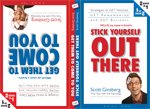 The world’s FIRST two-in-one, flip-flop book!
The world’s FIRST two-in-one, flip-flop book! 1. Crazy is a compliment. If everybody says you’re nuts, you just might be onto something. Therefore: The only valid response to someone who uses that word to describe you is, “Thanks!”
1. Crazy is a compliment. If everybody says you’re nuts, you just might be onto something. Therefore: The only valid response to someone who uses that word to describe you is, “Thanks!” 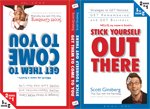 The world’s FIRST two-in-one, flip-flop book!
The world’s FIRST two-in-one, flip-flop book!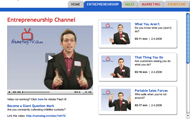
 1. Accepting. Don’t accept anyone else’s version of the truth. Don’t accept payment in politeness. Don’t accept the verdict that you’re not enough. Don’t accept that everyone you encounter has your best interests at heart. Don’t accept that life is out to get you. What have you mindlessly accepted?
1. Accepting. Don’t accept anyone else’s version of the truth. Don’t accept payment in politeness. Don’t accept the verdict that you’re not enough. Don’t accept that everyone you encounter has your best interests at heart. Don’t accept that life is out to get you. What have you mindlessly accepted?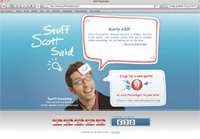 Who’s quoting YOU?
Who’s quoting YOU? “If everybody says you’re nuts – you just might be onto something.”
“If everybody says you’re nuts – you just might be onto something.”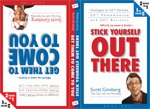 The world’s FIRST two-in-one, flip-flop book!
The world’s FIRST two-in-one, flip-flop book! A sponge is a loosely connected fibrous material primarily filled with empty space.
A sponge is a loosely connected fibrous material primarily filled with empty space. 